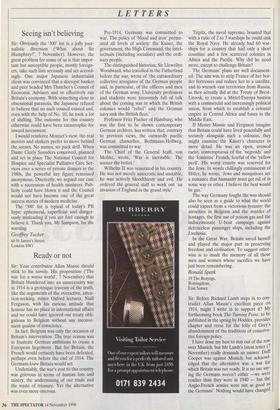Ready or not
Sir: Your contributor Allan Massie should stick to his novels. His proposition (`The war for a worse world', 7 November) that Britain blundered into an unnecessary war in 1914 is a grotesque travesty of the truth, like the arguments of the overactive, atten- tion-seeking, minor Oxford lecturer, Niall Ferguson, with his curious attitude that honour has no place in international affairs and we could have ignored our treaty obli- gations to Belgium without any inconve- nient qualms of conscience.
In fact, Belgium was only the occasion of Britain's intervention. The true reason was to frustrate German ambitions to create a European hegemony. But for Britain, the French would certainly have been defeated, perhaps even before the end of 1914. The Germans knew Britain would act.
Undeniably, the war's cost to this country was grievous in terms of human loss and misery, the undermining of our trade and the waste of treasure. Yet the alternative was even more onerous. Pre-1914, Germany was committed to war. The policy of 'blood and iron' perme- ated all levels of society: the Kaiser, the government, the High Command, the intel- lectuals (including socialists) and the ordi- nary people.
The distinguished historian, Sir Llewellyn Woodward, who travelled in the Fatherland before the war, wrote of `the extraordinary collective arrogance of the German people and, in particular, of the officers and men of the German army. University professors and students were tiresomely full of talk about the coming war in which the British colonies would "rebel" and the German navy sink the British fleet.'
Professor Fritz Fischer of Hamburg, who was the first to be shown contemporary German archives, has written that, contrary to previous views, the outwardly pacific German chancellor, Bethmann-Hollweg, was committed to war.
The Chief of the General Staff, von Moltke, wrote, War is inevitable. The sooner the better.'
Wilhelm II was venerated in his country. He was not merely autocratic and unstable, he was actively bloodthirsty and evil. He ordered the general staff to work out 'an invasion of England in the grand style'. Tirpitz, the naval supremo, boasted that with a ratio of 2 to 3 warships he could sink the Royal Navy. He already had 60 war- ships for a country that had only a short coastline and a few scattered colonies in Africa and the Pacific. Why did he need more, except to challenge Britain?
The Germans' plans are well document- ed. The aim was to strip France of her bor- der fortresses and reduce her to a satellite, and to wrench vast territories from Russia, as they actually did at the Treaty of Brest- Litovsk, to create a Mittel-Europa bastion with a commercial and increasingly political union, from which to establish a colonial empire in Central Africa and bases in the Middle East.
If Messrs Massie and Ferguson imagine that Britain could have lived peacefully and securely alongside such a colossus, they might examine the Kaiser's character in more detail. He was an open, avowed racist, contemptuous of the 'negroids' and the 'feminine' French, fearful of the 'yellow peril'. His worst enmity was reserved for the Jews. In words chillingly reminiscent of Hitler, he wrote, 'Jews and mosquitoes are a nuisance that humanity must get rid of in some way or other. I believe the best would be gas.'
The way Germany fought the war should also be seen as a guide to what the world could expect from a victorious tyranny: the atrocities in Belgium and the murder of hostages, the first use of poison gas and the indiscriminate U-boat campaign against defenceless passenger ships, including the Lusitania.
In the Great War, Britain saved herself and played the major part in preserving freedom and civilisation. To suggest other- wise is to insult the memory of all those men and women whose sacrifice we have just been remembering.
Ronald Spark
19 The Rotyngs, Rottingdean, East Sussex


















































































 Previous page
Previous page